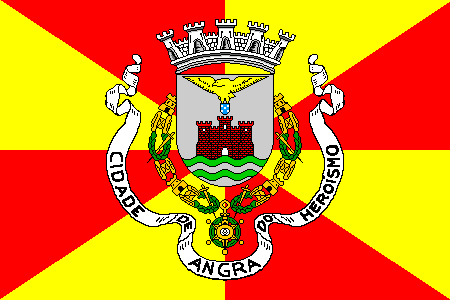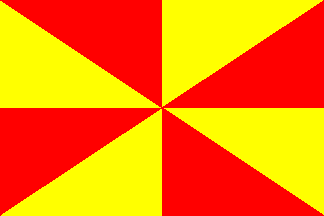
Last modified: 2006-02-05 by antonio martins
Keywords: angra do heroísmo | coat of arms (castle: red) | goshawk | waves: 3 | quina | castle (red) |
Links: FOTW homepage |
search |
disclaimer and copyright |
write us |
mirrors

The flag is a red over yellow gyronny with
coat of arms in the center. The coat of arms has a 5-towered mural crown, a
silver shield charged in chef with a yellow hawk holding a quina in
it’s claws, three wavy stripes of green-silver-green below and in the center
a red castle with white door and windows, the collar of the
Order of Tower and Sword and a white scroll
reading "CIDADE DE ANGRA DO HEROÍSMO" in black letters.
Jorge Candeias, 31 May 1998
The meaning of the various charges of the coat of arms is probably: the
hawk and quina stand for the Azores (these
charges appear in nearly all the azorean municipal coats of arms), the
green waves stand for the sea, since this town is a sea harbor (like all the
other azorean heads of municipality), and the castle must represent the city’s
fortifications and history, since this city was the beginning of the liberal
revolution in the XIX century that after a civil war conquered the power from
the supporters of D. Miguel, an absolutist king, and that caused the adoption
of the blue-white flag in Portugal.
Jorge Candeias, 31 May 1998

Gyronny of red and yellow.
Jorge Candeias, 12 Jul 1999
Angra do Heroísmo (that could be translated as "bay of heroes"),
is an azorean city, capital of the island
Terceira. It used to be the head of the
district of Angra do Heroísmo, before
the Azores became an Autonomous Region and the azorean districts
where supressed. The municipality has 237,5 km2 and over
35 500 inhabitants in 19 communes. It’s economy is varied,
with tourism, services, agriculture and food industries as the main
activities.
Jorge Candeias, 31 May 1998